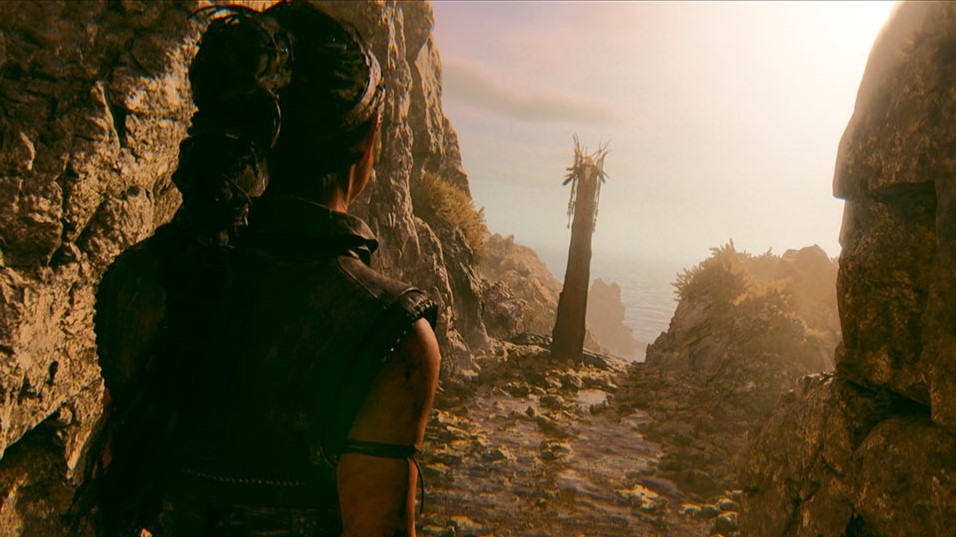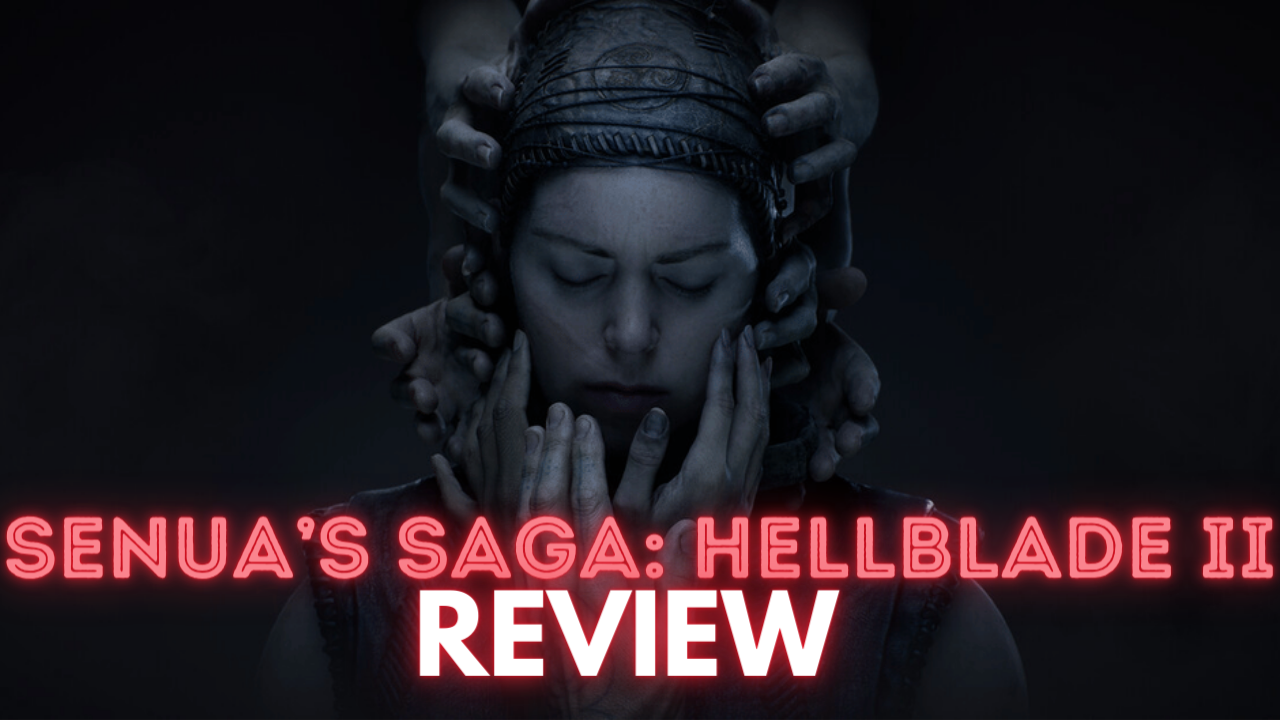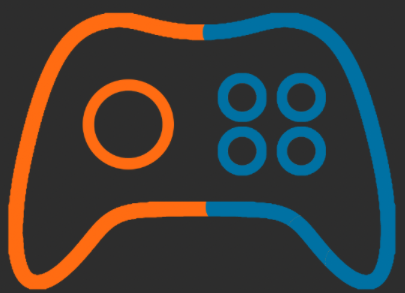Senua’s Saga drags you bruised and bloody into a world inspired by Nordic mythology – instantly setting the player up for a one-of-a-kind experience.
The first instalment in the Hellblade series was renowned for its realistic portrayal of psychosis, through the lead character Senua as she embarks on a gripping, horrifying and brutal journey to find her lost lover.
Hellblade II, developed by Ninja Theory, follows on from its predecessor with exactly the same tone despite the sequel coming out seven years later than the original.
You are instantly plunged into the icy depths of the sea, bleeding and weak from a crash at sea. This brings the voices inside Senua’s head right back into the mix, pushing her forward to escape death.
Despite the fact that I listened to the voices on TV sound instead of headphones, the audio still offered a disturbing insight into what Psychosis is like. For me, this portrayal of insanity is the game’s biggest success, with the sinister voices surrounding Senua lingering with the player as you navigate the game’s levels.
The game is filmed as one continuous shot, with no loading screens breaking the player’s immersion – keeping you as close to Senua as possible, as she traverses Iceland.
Senua once again shines in the game, with the player feeling connected to her as you feel what she’s going through. The sound design remains phenomenal, and is some of the best I have seen in modern gaming.
Character models in general look amazing – and the graphics of the entire game are incredible. I constantly would stop to look at the vistas, pausing to go into photo mode. I was constantly in awe.

The vistas you can explore are awesome… I felt pushed to explore as much as I could in each section – the art team did a phenomenal job.
The story is intriguing and well written – I was fully captivated throughout my seven hours of playtime. It built upon the firm foundations forged in the first game, and it repeatedly left me feeling repulsed. However, with this sort of game, that’s the exact feeling I look for.
The voice acting is also great. Melina Juergens – who voices Senua – once again gives an exceptional performance. The acting of all of the characters is emotive, captivating and the cast’s talent is on full display here. This made the game’s focus on dialogue extremely enjoyable for me.
The story also had a satisfying beginning, middle and end which I always enjoy: It felt like a full experience, despite its shorter runtime.
However, in my opinion the games length sees characters other than Senua being less well-written. I felt they were used more as plot devices, instead of being given any meaningful characterisation, which was a shame because I was intrigued to hear more of the world through the rest of the cast, but I understand the developers’ decision for a more singular perspective.
The game’s exploration of Senua’s psychosis is once again well-done. You can tell the team spent hours researching and checking that their portrayals were as accurate as possible, even including a trigger warning at the beginning of the game – this should be praised for the studio’s intention to represent the illness in a meaningful and respectful way.
I do think that the length needs to be discussed: While I’m all for games that know how to tell a thought provoking story and ‘when to finish’ – for a game to cost £50 and be around six hours is unacceptable. If I paid full price for this, then I would feel stronger about this element but the game’s inclusion on Xbox Game Pass makes this bearable. While the quality is undeniable, I’d still say this isn’t good value.
This is still very much Senua’s story – or her ‘saga’, as she battles not only the darkness within her, but also in combat against numerous different types of enemies.
The combat in this game was a tricky one for me. The game has you face one enemy at a time in a cinematic kind of loop. Once one falls, at that moment another enemy appears in the situation. I found this disrupted the pacing of combat. Although it kept you zoned in on one combatant, allowing Senua to display her warrior capabilities, it felt slow and sluggish to me.
I also wasn’t overly good at the game, which likely didn’t help. I found myself looking forward to when the combat sections ended, and the exploration element could return. The change in combat was something which I felt wasn’t improved from the last game, as I preferred the voices playing more of a role in guiding you through the chaos of multiple combatants.
Although not combat sections, any moment with giants in the game were among my favourites, as they were menacing and terrifying. I felt Senua’s fear when she was hiding from them. As a replacement for boss battles, they serve to remind the player of the human aspect of this story, alongside all of the supernatural. I liked knowing that I couldn’t fight them – I just had to run, it really upped the stakes.
Alongside combat are the puzzles, which I found weren’t enough of a challenge: They are simple and reminiscent of the previous game… calling them puzzles feels like a stretch, really. I would’ve liked to see some more thought provoking sections, which require the player to test their limits a little further.
Pacing in general is also something I struggled with in this game. Some sections are lengthy walks, with not much of interest filling the time – asides from the voices in Senua’s head. I found myself exploring some areas and checking my watch… luckily, these moments were few and far between, but they were still there.
Overall, I know this game isn’t going to be for everyone. If you like slower, story paced games which offer an immersive escape – albeit a short one – I would recommend you check this out. However, accessing it through game pass is a must.
However, if you have a preference for thrilling combat, or fast paced action, or were just considering paying the full price for the game – I’d recommend you hold off.
Senua’s Saga: Hellblade II is a deeply rich experience where you can feel the passion the developers put into the experience through every precise detail. When this game gets it right – from the sound design to the graphics – it perfects it, though. However, it is also slow and short in places, and besides Senua, has some lackluster characters.
Therefore, after taking all of this into consideration I would give this game a 7/10. It is Above Average and a unique, thought provoking experience which will leave you wishing there was more – and equally disturbed from the experience.
This article was edited by Eddie Bryant


